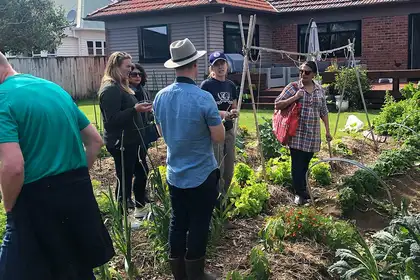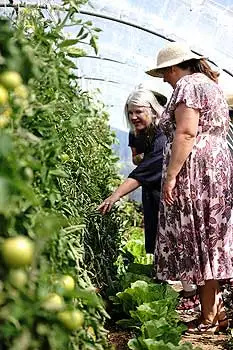
Associate Professor Sita Venkateswar (right) visiting an urban-based sustainable food grower in Taranaki as part of the Farm Next Door initiative.
Taranaki is well-known as one of the country’s key dairy regions but vegetables, berries and nuts are taking their place alongside milk and cheese. Massey researchers have been collaborating with local sustainable food growers amid pressures to diversify the nation’s farming practices.
Science, social science and business researchers have been part of a regional initiative, Farm Next Door to understand and collaborate with a network of small-scale growers who farm sustainably, organically, or regeneratively to earn income from their land and supply produce for the community.
Participants will celebrate local initiatives and Massey project co-leaders Associate Professor Sita Venkateswar and Dr Nitha Palakshappa, Associate Head of the School of Communication, Journalism and Marketing, will share research findings at a Long Lunch, an all-day event this Saturday.
The event is also a chance to foster ongoing conversations and to collect further feedback from the community of growers, producers, eaters, and a wide variety of associated stakeholders who are interested in enhancing the region’s ability to grow high quality, nutrient-dense produce.
Dr Venkateswar, a social anthropologist in the School of People, Environment and Planning, says the project is about having a deeper understanding of this growing movement and shifting mindsets around food production.
“We are excited to be presenting our findings and to showcase the variety of ways that local producers are adapting to local and global environmental challenges and the changing needs of their communities. In the context of a changed world since Covid-19, for an export-oriented economy like Aotearoa New Zealand, it is more crucial than ever before, and timely that we address the importance of domestic food systems for domestic eaters. This is what will enable resilient and thriving smallholder (owner operated) food production and local food hubs for communities across the country,” she says.
Dr Palakshappa says the purpose of their work is not only to understand food production, but to also explore consumption. “We are interested in how best to encourage consumers to access and consume differently. Finding a ‘niche’ in the food system has been a recurring issue that many producers have talked to us about.”

Goldbush Micro Farm near Hawera
Pivot Award inaugural project
The collaboration began early last year as a partnership project between Farm Next Door – a growing network of small-scale urban organic market gardens in central New Plymouth led by Carl Freeman – and Massey University researchers and associates. Farm Next Door has a strong focus on soil health and crop diversity, and creating a supply chain that is sustainable both environmentally and economically.
The successful research project, titled ‘Farm to Flourish’, received the inaugural $100,000 Pivot Award, a premier research award aimed at enabling innovation in Taranaki's agriculture sector. Also on the team is Dirk Roep from Wageningen University, Netherlands, whose Rural Sociology Group has been involved in various studies on alternative value chains and food networks in the Netherlands and Europe.
Massey University Bachelor of Agricultural Science student and research assistant Rebecca Algie is involved in the project. “I’m interested in a holistic approach to farming that is regenerating our soils and communities, reconnecting people to what they eat. I’m passionate and excited about the regenerative agriculture movement within New Zealand.”
Erin Withers completed a Master’s in International Development earlier this year titled: ‘Indigenous Approaches to Achieving Food Security and Sustainable Agriculture in Aotearoa New Zealand: Why Culture Matters in Achieving Sustainable Development Goal 2’.
“My research focus was on addressing the challenges of food security and sustainable agriculture which features prominently in Sustainable Development Goal 2 (SDG2): Zero Hunger to ‘end hunger, achieve food security and improved nutrition and promote sustainable agriculture’,” he says. He explored “the cultural constructs associated with food security and sustainable agriculture in the context of Sustainable Development Goal 2 from an Indigenous Māori perspective.”
And Heidi McLeod, a Master of Arts in Geography student, is exploring regenerative food systems taking a comparative approach with small scale food producers in Taranaki and Hawke’s Bay. She also coordinated the Long Lunch event.
Speakers will share insights on a range of issues, including on urban and small scale gardening; regenerative food systems, innovative technology and a national food strategy. Indigenous perspectives on the agenda include Māori food sovereignty, healing, wellbeing and reconciliation through food.
Speakers:
- Carl Freeman - Farm Next Door initiator
- Maria Lempreire - Urenui-based Peihana Farm ‘community initiator’
- Pounamu Skelton - project collaborator and Hua Parakore practitioner
- Fiona Young - regenerative agriculture and growing innovator
- Dr Denise Conroy - Plant and Food Research
- Angela Clifford – CEO of Eat New Zealand
In addition, Pepper Curry, a graphic facilitator, will render the discussions into graphic form at the event and these will be available to attendees to interact with and respond to, says Dr Venkateswar.
About the lunch
Alongside feeding back research findings to this community, the aim of the event is to foster broader conversations about our food and how we farm.
Five dishes will be created by local chefs and some of Taranaki’s best supporters of locally grown produce, including Landon Elder from George’s, Terry Parkes of Table at Nice Hotel, Nico of Toret Cucina Italiana in Oakura, and Jeremy Webling of Fork n Knife. Produce for the dishes have been supplied by the Farm Next Door network of food producers.
“Food production is an essential ingredient in Taranaki’s economy, and is one of our deep strengths,” says Justine Gilliland, CE of Venture Taranaki. “The Massey-led Farming to Flourish project contributes to the richness and depth to our food story in Taranaki, and through the shared knowledge and practices of our small-scale growers, we can enhance our vibrant, smart, fast-growing and sustainable food production industry in Taranaki.”
Event details:
Farming to Flourish Long Lunch
Saturday, 1 May 10.30am – 4pm
Oakura Hall, Main Rd, SH45 Oakura